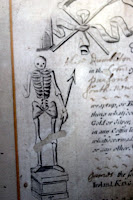
|
|
Today I thought about time measured objectively by a watch or clock, and the uncertainty behind the act of observing the device. , I always marvelled at that strange experience of looking at a wrist watch, and how the second hand briefly appears to go into reverse when we check for the time. A common experience I think, but with much to educate us on how our physiology is not always giving us the right - or rather, any consistent - conduits to reality.
An approach to the problem is to consider this: if the arrow of time moves from past to future in units of days, hours, seconds, nanoseconds and so on, is there any smallest unit beyond which time can be divided no further? And if there is such a smallest unit, does the essence of time consist in the flicking by of such units like the beads on some vast cosmic abacus? (This image, and this idea is entirely lifted from the remarks of a good friend with whom I discussed the subject).
And if time proceeds thus – as my friend pointed out - then two big questions arise: What happens within the units? and what happens between the units? That moment between the decision to observe the time, and to consciously identify its measure, is a place where it is possible to believe in a dimension which is outside of both time itself, and is indecipherable by the time-bound mind of the individual.
Some of these thoughts have been prompted through a recent reading of a new critique of T.S. Eliot's "Rhapsody on a Windy Night”. This poem is the one which describes an arc of time in which a flâneur is wandering the streets with an ostensible purpose: to get to his numbered apartment at the end of his wandering.
On the way, we are given time checks. But we are also given a stream of unconscious memories filtering and surfacing in his mind. The poem sets up a juxtaposition on the one hand between objective moments - " 12 o'clock ", "half-past one", etc: and on the other hand a subjective flow of memories which by definition are elastic, qualitative, time-indeterminate, coming from, as it were, "nowhere". And so also a juxtaposition of "habit" and "dreams" where time has two (at least) separate qualities.
I learnt from reading Jewel Spears Brooker's 2018 critique on Eliot, that Eliot wrote the poem after becoming disillusioned with the teachings of Bergson, whom he briefly championed, and whose lectures he attended in 1910/11 in Paris. The tension between pure consciousness and the challenges of a time-bound, time-dictated existence is palpable in these lines at the end of the poem.
The bed is open; the toothbrush hangs on the wall,
Put your shoes by the door, sleep, prepare for life.
The last twist of the knife.
Bergson’s lectures in Paris in 1910–11 featured a concept of ‘pure duration’, contrasting it with the rigid demarcations of the clock. In ‘Rhapsody on a Windy Night’, written in 1911, the clock time is announced at regular intervals and again, there is a tension and a discrepancy between those objective markers of time and the speaker’s experience of pure duration in these lines:
Twelve o’clock.
Along the reaches of the street
Held in a lunar synthesis,
Whispering lunar incantations
Dissolve the floors of memory
And all its clear relations
Its divisions and precisions,
Every streetlamp that I pass
Beats like a fatalistic drum
The progress of time through the deep of night drives Eliot’s speaker forward like a ‘fatalistic drum’, through ‘Half-past one’, ‘Half-past two’, ‘Half-past three’ and finally ‘Four o’clock’.
By contrast, the speaker’s consciousness points backwards, as every new thing he encounters takes him back though linked associations, to painful, difficult or banal memories.
For Eliot, in this poem, the ‘divisions and precisions’ of the clock, its ‘clear relations’, conflict with a human consciousness which can only exist from retrospective constructs, insulated against fresh experiences by a time-bound crust of memory. No “pure duration” here.
Bergson’s optimism that this artificial construct of clock-time, or time as an arrow, could be cauterised and dissolved in the experience of pure duration, is refuted in Eliot’s rhapsody. There is a much more pessimistic reality here, with the speaker’s thoughts ushering him robotically and despairingly forward, with no sense of a dimension where a creative peace might exist.












